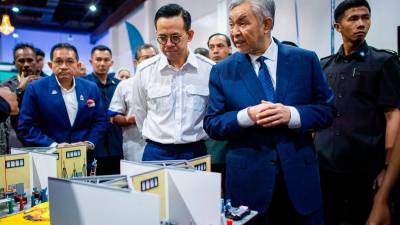KUALA LUMPUR: Malaysia’s Technical and Vocational Education and Training (TVET) reforms have boosted graduate employability to 95.1 per cent, with more than 430,000 students now enrolled nationwide, said Deputy Prime Minister Datuk Seri Dr Ahmad Zahid Hamidi.
Ahmad Zahid, who is also National TVET Council (MTVET) chairman, said 53.56 per cent of the country’s secondary school leavers in 2024 chose TVET as their first option, marking a significant shift in national education trends.
“When I was entrusted by Prime Minister Datuk Seri Anwar Ibrahim in 2023 to chair the National TVET Council, I knew this was more than just a policy role,“ he said when opening the ASEAN TVET Conference (ATVET) 2025 at the World Trade Centre Kuala Lumpur (WTCKL) here today.
The reforms, he said, were anchored on integrating 12 ministries under one vision, aligning skills training with market demand and ensuring inclusivity so that no community is left behind.
This led to the development of the National TVET Policy 2030, the TVET Big Data System, the TVET MADANI Portal and the UP_TVET application system connecting students to opportunities across ministries.
He said Malaysia has also introduced new certification levels equivalent to higher education qualifications and expanded minimum wage coverage to semi-skilled and TVET graduates under MASCO Code 8 and above.
“These are not just numbers. They are stories of transformation, from a fisherman’s son who is now a drone technician to an Orang Asli daughter leading solar installations in her village, and a former factory worker who now owns a welding workshop employing 12 others,“ he said.
Ahmad Zahid, who is also the Minister of Rural and Regional Development, said the Prime Minister has placed TVET at the heart of the 13th Malaysia Plan to power high-growth, high-value sectors such as semiconductors, artificial intelligence, renewable energy and the digital economy.
He said Malaysia is embedding TVET into strategic industrial zones, including the Johor-Singapore Special Economic Zone, Kulim Hi-Tech Park, Kerian Integrated Green Industrial Park and the Sabah-Sarawak growth corridors to match skills supply with investment demand.
The target, Ahmad Zahid said, is to place Malaysia among the world’s top 20 in the Global Innovation Index and to create 1.2 million high-value jobs in manufacturing and the digital economy within five years.
Malaysia is also strengthening its TVET agenda globally, having forged impactful pathways, including 5,125 industrial placements in China, collaboration with the Mohamed bin Zayed University of AI in Abu Dhabi, and skills exchanges with Japan, Germany and Australia.
“This is why Malaysia has proposed the establishment of an ASEAN TVET Certification & Excellence Hub as a central body to set benchmarks, ensure mutual recognition and promote skilled worker mobility across borders.
“What we decide here will determine whether those dreams are realised or left behind. Let us commit not with promises that fade, but with policies that endure, partnerships that deliver, and actions that transform,“ he added.
The ATVET 2025, themed Advancing Digital and Green Transformations through an Inclusive and Future-Ready TVET System, brings together over 1,500 delegates for two days of discussions to advance TVET as a driver of inclusive digital and green transitions across ASEAN.
Jointly organised by the Human Resource Development Corporation and the Skills Development Fund Corporation Malaysia, the event is the fourth flagship platform under the ASEAN Year of Skills (AYOS) 2025, featuring 23 speakers and participants comprising policymakers, industry leaders, education providers, workers’ organisations and international partners.- Bernama
